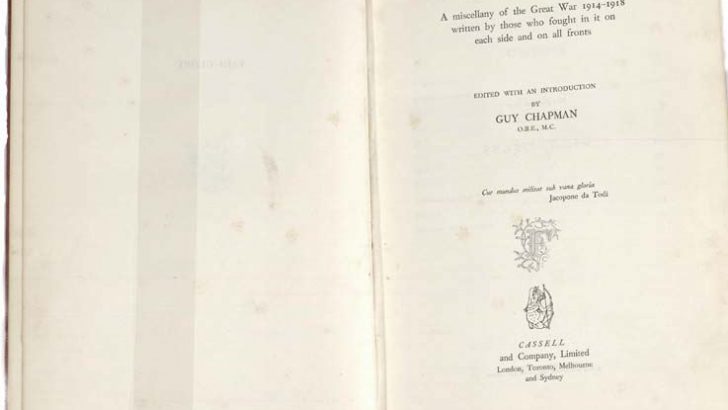The World of Books by the books editor
The literary commemoration of the Great War takes many curious forms these days. But none can be more curious than the recent suggestion by Prince William, the Duke of Cambridge, that a new renaissance of war poetry should be encouraged among modern soldiers.
He had in mind the great heritage of Great War poetry, by Wilfred Owen, Robert Graves, Siegfried Sassoon and, sadly, so many others.
But the prince seems not to realise that the war was celebrated in other forms of verse than cannot be called poetry, the kind patriotic poetry which praised efforts to save civilisation (indentified with Anglo-American culture) from what Chesterton called “the dreadful Hun”.
It was not until the end of the 1920s that the books that we take to be the true commemoration of the war began to appear, when at last the real writers managed to soothe their tortured minds and to relate their experiences: Goodbye to All That, Robert Graves’ memoir, appeared in 1928; it was later followed by Siegfried Sassoon’s Memoirs of an infantry Officer, the novels of Henry Williamson, Sagittarius Rising by Cecil Lewis, Frederic Manning’s Her Privates We. Abroad there were similar books; one thinks of Henri Barbusse’s Le Feu, Remarque’s Im Westen nichts Neues and other books by Germans, Czechs, Southern Slavs and Russian writers.
The commemoration of war was not then a matter of celebration at all. These writers knew very well that the deaths of millions in the war, and the further deaths from the Spanish flu epidemic that swept the world afterwards (killing even more people that the war), could be put down the account of the national leaders, the politicians, the career generals, the “old men who failed”, as the young generation came to call them.
The literature of the Great War on a universal scale was anthologised by the soldier, historian and publisher Guy Chapman in his important publication Vain Glory: A Miscellany of the Great War 1914-1918 written by those who fought on all side and on all fronts (London, 1933; reissued 1968). Chapman himself was the author of a war memoir, A Passionate Prodigality (1933).
His point of view is one which commemorators even to this day still try to avoid. There is a tendency to celebrate the ordinary combatants. This is right and proper. But it has to go hand in hand with a denunciation of the attitudes and policies and the fatuous foolishness of those old men that took the world to war.
One has to respect the pious hope of Prince William that his country’s wars, which have been many since the cease fire of 1918, will not be forgotten in literary form. Yet to call for “a renaissance of war poetry” seems to be a quite mistaken notion.
Dictators
New war poetry implies new wars. What we need to have, and which Christians and every human being of good will has to strive for, is no war at all. Pacifism should be the true creed of all. But we are told we have to resist the wicked dictators, a cry that that been put forward in every decade since. Democracies can only go to war in a “good cause”.
But Christians should always bear in mind – and Catholics sometimes need to remember that they are Christians too – that they are explicitly commanded to “resist not evil”.
These are Jesus’s own words: “But I say to you resist not evil: but if one strikes thee on thy right cheek, turn to him also the other cheek.” (The context can be found in Matthew 5: 39-48.)
The passage ends with the command “Be you therefore perfect…” But was it not Chesterton (I hesitate over the reference) who remarked that perfection only walked once on the earth.
We cannot use our imperfections to allow our leaders to murder millions.
The prince is well meaning. But these present commemorations are not really intended to recall the dead, but to enhance the standing of the living in thier own eyes.
A call for complete pacifism will always go unheeded while we elect leaders like Donald Trump.


 Peter Costello
Peter Costello
